Fedecovera: Recovering a vital part of Maya Culture in Verapaz
The history of cacao and chocolate is inextricably linked to Mesoamerica and the Olmec, Zapotec, Maya, Toltec and Aztec peoples. The Mesoamerican region extended from what we now know as northern Costa Rica all the way up to central and southern Mexico, including Nicaragua, Honduras, El Salvador, Belize and Guatemala. Cacao held a religious and spiritual significance for these cultures and up until the early 20th century, was used as a form of currency in some parts of Guatemala.
According to official statistics of the government of Guatemala, approximately 42% of the population of the country is comprised by indigenous people of Maya ancestry. The Q’eqchi is the second largest Mayan ethnic population in Guatemala, with population concentrations in the Alta Verapaz and Petén areas.
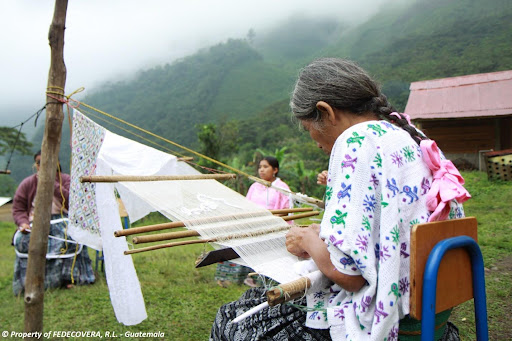
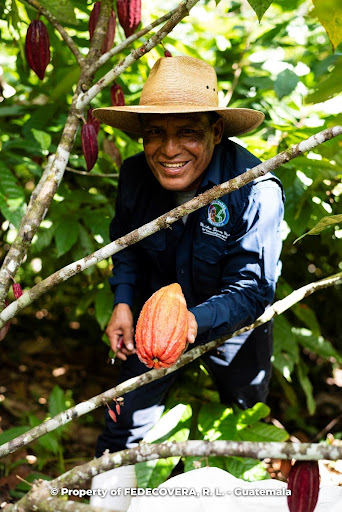 In 2011, FEDEOVERA integrated the cocoa supply chain into their business model after five years of preparations: selecting genetics, assessing the plantations, training the farmers and organizing them. It was important to the members to rescue this ancestral part of their culture and support those farmers to structure their production and improve the quality.
The federation was able to recuperate Acriollado materials from Mayan regions and distribute these to their members. They also built post harvesting facilities to process the wet cocoa mass which is collected from the members. The fresh cacao is bought always at the most competitive prices in the market.
In 2011, FEDEOVERA integrated the cocoa supply chain into their business model after five years of preparations: selecting genetics, assessing the plantations, training the farmers and organizing them. It was important to the members to rescue this ancestral part of their culture and support those farmers to structure their production and improve the quality.
The federation was able to recuperate Acriollado materials from Mayan regions and distribute these to their members. They also built post harvesting facilities to process the wet cocoa mass which is collected from the members. The fresh cacao is bought always at the most competitive prices in the market.
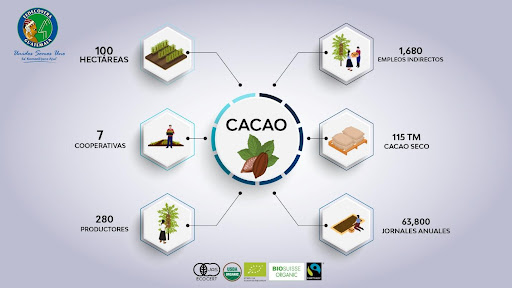 At the moment, cacao production involves 7 member cooperatives, 280 producers cultivating 100 hectares of land and producing 115 metric tons of cocoa beans a year. (Infographic provided by FEDECOVERA.)
At the moment, cacao production involves 7 member cooperatives, 280 producers cultivating 100 hectares of land and producing 115 metric tons of cocoa beans a year. (Infographic provided by FEDECOVERA.)
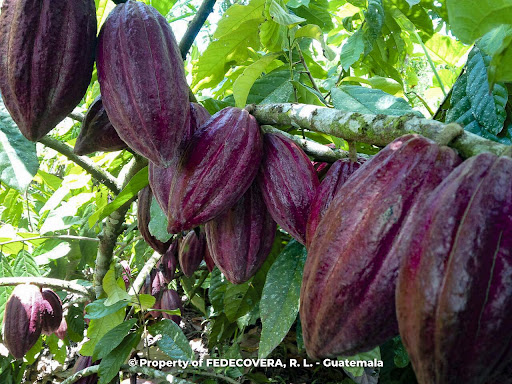
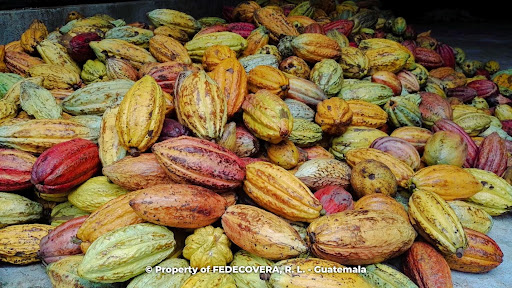
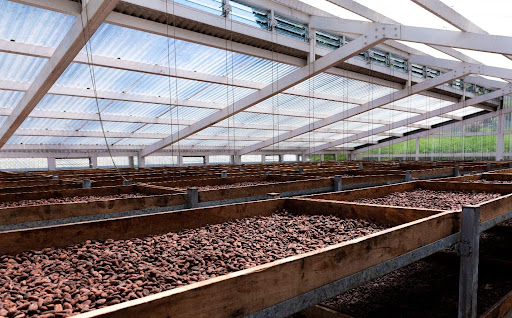 The members of FEDECOVERA grow their cacao in an agroforestry system. This system has not only contributed to recovering degraded areas and restoring landscapes, but it also protects against soil erosion and fosters diversity of local flora and fauna – some of which are endangered species. This also contributes to protecting three of the most important river basins on the Atlantic coast: Cahabon, Polochic and Motagua.
The members of FEDECOVERA grow their cacao in an agroforestry system. This system has not only contributed to recovering degraded areas and restoring landscapes, but it also protects against soil erosion and fosters diversity of local flora and fauna – some of which are endangered species. This also contributes to protecting three of the most important river basins on the Atlantic coast: Cahabon, Polochic and Motagua.
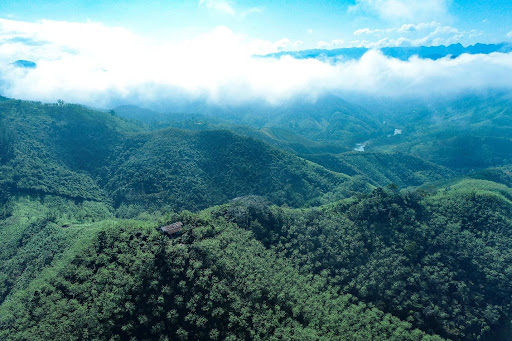
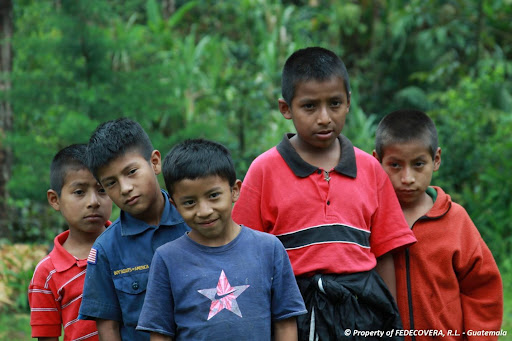 Want to know more about FEDECOVERA? Take a look at this video they shared with us, or you can visit their website here!
Want to try our FEDECOVERA Cahabón beans? Order your sample via our Cocoa Boutique!
Our latest lot has a higher percentage of criollo beans which has a big effect on the more usual profile of red fruit, cream, chocolate. This new lot has very outspoken herbal (laurel) and vegetative green notes with a Brazil nut ending.
Want to know more about FEDECOVERA? Take a look at this video they shared with us, or you can visit their website here!
Want to try our FEDECOVERA Cahabón beans? Order your sample via our Cocoa Boutique!
Our latest lot has a higher percentage of criollo beans which has a big effect on the more usual profile of red fruit, cream, chocolate. This new lot has very outspoken herbal (laurel) and vegetative green notes with a Brazil nut ending.

Q’eqchi woman weaving traditional textiles.
The Federación de Cooperativas de Verapaz (Federation of Coopratives of Verapaz) – FEDECOVERA – is a second level cooperative which is 100% owned and run by small scale producers of Maya Q´eqchi ethnicity. These producers are organized either into cooperatives or associations. FEDECOVERA represents 33,000 producing families organized in 42 cooperatives and more than 21 associations. These small holder farmers produce cardamom, coffee, tea, allspice, cocoa, turmeric, essential oils and sustainable timber. By diversifying their cash crops, the producers can also improve their earnings. In 2011, FEDEOVERA integrated the cocoa supply chain into their business model after five years of preparations: selecting genetics, assessing the plantations, training the farmers and organizing them. It was important to the members to rescue this ancestral part of their culture and support those farmers to structure their production and improve the quality.
The federation was able to recuperate Acriollado materials from Mayan regions and distribute these to their members. They also built post harvesting facilities to process the wet cocoa mass which is collected from the members. The fresh cacao is bought always at the most competitive prices in the market.
In 2011, FEDEOVERA integrated the cocoa supply chain into their business model after five years of preparations: selecting genetics, assessing the plantations, training the farmers and organizing them. It was important to the members to rescue this ancestral part of their culture and support those farmers to structure their production and improve the quality.
The federation was able to recuperate Acriollado materials from Mayan regions and distribute these to their members. They also built post harvesting facilities to process the wet cocoa mass which is collected from the members. The fresh cacao is bought always at the most competitive prices in the market.
 At the moment, cacao production involves 7 member cooperatives, 280 producers cultivating 100 hectares of land and producing 115 metric tons of cocoa beans a year. (Infographic provided by FEDECOVERA.)
At the moment, cacao production involves 7 member cooperatives, 280 producers cultivating 100 hectares of land and producing 115 metric tons of cocoa beans a year. (Infographic provided by FEDECOVERA.)

Acriollado cacao is grown by the members of FEDECOVERA on their plots along with other crops.

Harvested pods ready to be cracked open. The mass is then brough to the central fermentary.
 The members of FEDECOVERA grow their cacao in an agroforestry system. This system has not only contributed to recovering degraded areas and restoring landscapes, but it also protects against soil erosion and fosters diversity of local flora and fauna – some of which are endangered species. This also contributes to protecting three of the most important river basins on the Atlantic coast: Cahabon, Polochic and Motagua.
The members of FEDECOVERA grow their cacao in an agroforestry system. This system has not only contributed to recovering degraded areas and restoring landscapes, but it also protects against soil erosion and fosters diversity of local flora and fauna – some of which are endangered species. This also contributes to protecting three of the most important river basins on the Atlantic coast: Cahabon, Polochic and Motagua.

Cacao producing area along the Cahabón River in Alta Verapaz. Photograph courtesy of FEDECOVERA
Since its creation in 1976, FEDECOVERA has played a key role in the organization of its cooperative and association members as well as in the livelihoods of each and every on of their smallholder producer members. In the words of FEDECOVERA themselves: Our main purpose of existence is to provide benefits and effective and efficient services to our cooperatives and associations. We aim to have a direct impact on our small-scale farmers members. We do this by commercializing our products in international markets. We are a second level Cooperative enterprise doing business in a highly competitive globalized world, achieving our own self-sustainability. Among the benefits and services we provide our members are: health services, education, access to low or 0% loans, Geographical Information System mapping, permanent agrotechnical assistance, social assistance, trainings on topics such as: organic farming practices, governance, transparency, gender equality and youth inclusion. We also provide commercialization, project development and management services. Our members have access to high quality seedlings at our biotechnology lab and nursery as well as access to bio-fertilizers produced at our bio-factory. Want to know more about FEDECOVERA? Take a look at this video they shared with us, or you can visit their website here!
Want to try our FEDECOVERA Cahabón beans? Order your sample via our Cocoa Boutique!
Our latest lot has a higher percentage of criollo beans which has a big effect on the more usual profile of red fruit, cream, chocolate. This new lot has very outspoken herbal (laurel) and vegetative green notes with a Brazil nut ending.
Want to know more about FEDECOVERA? Take a look at this video they shared with us, or you can visit their website here!
Want to try our FEDECOVERA Cahabón beans? Order your sample via our Cocoa Boutique!
Our latest lot has a higher percentage of criollo beans which has a big effect on the more usual profile of red fruit, cream, chocolate. This new lot has very outspoken herbal (laurel) and vegetative green notes with a Brazil nut ending.




